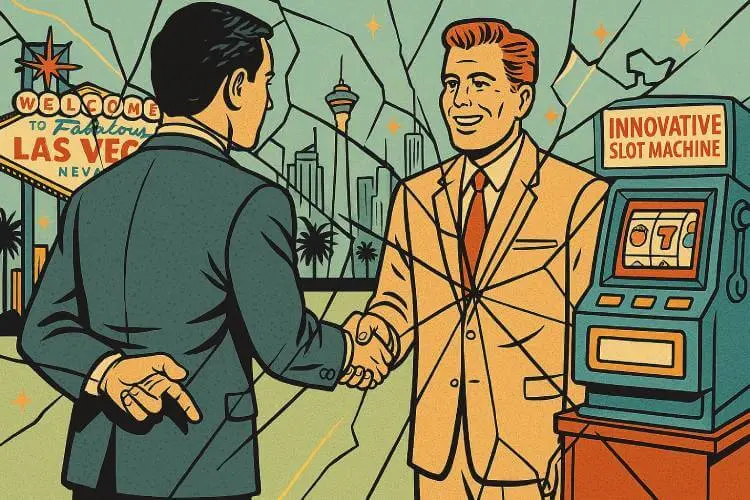Tipping Point Gaming Wins $20 Million Against Caesars Entertainment

Tipping Point Gaming LLC has secured a $20 million jury award against Caesars Entertainment in a long-running dispute over patented slot machine technology. The decision came after years of litigation that began when Tipping Point accused Caesars of fraud, bad faith, and malicious interference with business prospects. Following a trial in Clark County District Court, the jury found Caesars liable for interfering with Tipping Point’s potential business relationships and awarded significant punitive damages.
The verdict brings a significant chapter in a dispute to a close, highlighting the risks that smaller companies face when partnering with larger corporate players in the gaming industry.
A Decade of Disputes Over Slot Technology
The origins of the case date back to 2014, when Tipping Point, led by engineer and entrepreneur Sam Johnson, entered into an agreement with Caesars Entertainment. The goal was to bring Tipping Point’s patented "picture-in-picture" slot machine feature to market. The technology was designed to add a new dimension to slot machine gameplay by enhancing side bets and creating a more engaging user experience.
At the time, partnering with Caesars made sense. Caesars had a strong reputation for introducing innovative casino games. They were seen as a perfect match to help secure Gaming Laboratories International (GLI) certification, a crucial step in deploying the technology across casinos.
However, the partnership soon unraveled. According to court documents, Caesars failed to fulfill the terms of the agreement. Tipping Point alleged that Caesars deliberately stalled progress, raised challenges over ownership of the intellectual property, and eventually terminated the contract without warning. Internal communications presented during the trial included emails from Caesars executives discussing ways to block or delay Tipping Point’s GLI certification efforts and strategies to prevent the technology from reaching the market.
The jury ultimately concluded that Caesars’ actions constituted intentional interference with Tipping Point’s expected business opportunities, paving the way for the $20 million award.
Tipping Point’s Long Road to Victory
Winning the case was a hard-fought battle for Tipping Point. Over the years, litigation costs mounted, draining the company's resources and forcing it to consider selling its assets. The legal delays made it difficult for Tipping Point to capitalize on its innovation, with key opportunities slipping away while the case remained unresolved.
Despite these setbacks, the evidence presented during the trial, along with support from a Nevada Supreme Court ruling in 2024 that called for a retrial, strengthened Tipping Point’s position. The jury agreed that Caesars’ interference was not only deliberate but damaging enough to warrant punitive damages.
While the $20 million verdict offers validation, the victory remains bittersweet. Tipping Point’s loss of market momentum and strained finances may never be fully recovered, even with the legal win.
Broader Implications for the Gaming Industry
The outcome of this case is being closely watched by gaming industry insiders, especially in Nevada, where innovation drives growth. Tipping Point’s story has sparked broader discussions about the vulnerability of smaller tech companies when dealing with larger, more powerful operators.
Industry experts suggest that without stronger protections, Nevada risks losing some of its brightest innovators to offshore markets. If smaller firms cannot rely on fair dealings and enforcement of agreements, the incentive to invest in new gaming technology diminishes. Over time, that could hurt Nevada’s position as the heart of the U.S. gaming industry.
There is now a renewed emphasis on the importance of transparent contracts, respect for intellectual property, and equitable partnership practices. Analysts believe this ruling sends a strong message: even the most prominent companies will be held accountable when they violate agreements and harm emerging businesses.
Although Caesars has remained silent on the ruling, the judgment is likely to influence how large casino groups manage partnerships with technology startups in the future. It could encourage better behavior in negotiations, clearer contractual obligations, and more cautious handling of third-party innovations.
Lessons for Small Innovators
Tipping Point’s experience offers key lessons for smaller gaming technology firms. First, partnerships with major operators, although attractive, come with risks that must be carefully managed. Strong contracts, explicit protections for intellectual property, and documented communications are critical from the start.
Second, perseverance matters. Tipping Point’s years-long battle was grueling, but ultimately, holding a larger company accountable proved possible. The case demonstrates that even smaller businesses can achieve justice when they build a strong case and persevere through the challenges.
Ultimately, the gaming industry’s future will depend on striking a balance between the power dynamics between large operators and small innovators. Without new technology feeding into the market, player engagement will stagnate. Cases like this remind the industry that innovation must be nurtured, not crushed.
A Cautionary Tale Moving Forward
The dispute between Tipping Point and Caesars serves as both a warning and a hopeful reminder. While the road was rough, Tipping Point’s eventual success demonstrates that smaller companies do have recourse when wronged by bigger corporations.
However, the damage done to Tipping Point’s business demonstrates that legal victories often come too late to undo the harm fully. Protecting innovation in the gaming industry requires more than winning lawsuits; it requires creating an environment where small companies can safely grow and thrive from the beginning.
In the future, developers, regulators, and operators alike will need to work together to foster a healthier ecosystem where innovation isn’t just celebrated but genuinely protected.
Key Takeaways
- Tipping Point Gaming won $20 million in a patent dispute against Caesars Entertainment.
- The jury found Caesars guilty of malicious interference with business opportunities.
- The ruling underscores the importance of protecting small innovators in the gaming industry.
- Industry experts believe the case will influence future dealings between casinos and technology startups.
Stay Informed
Sign up for our newsletter to get the latest gaming news, legal updates, and exclusive insights delivered straight to your inbox.
You Might Also Like:
Was this article helpful?
